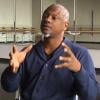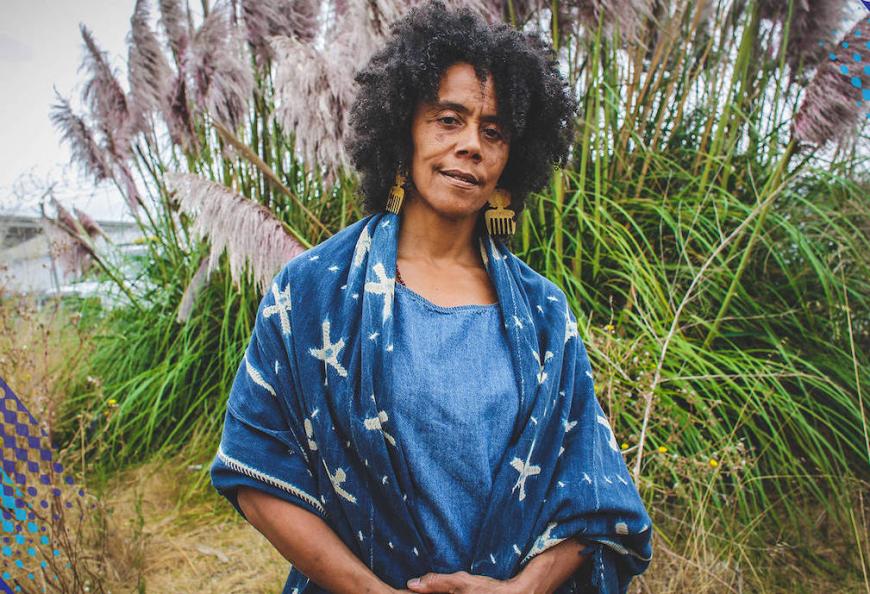
Amara Tabor-Smith inhabits two houses. In a world of have and have not, the Oakland-based choreographer and performance creator’s fortunate-to-have “home” comes in the form of a $100,000 Rainin Fellowship, a new initiative inaugurated in 2021 by the Kenneth Rainin Foundation in partnership with national arts funding nonprofit United States Artists. The untethered funds awarded to Tabor-Smith and three additional Bay Area visionary artists working to advance their fields in either dance, film, public space, or theater, are accompanied by supplemental support for financial planning, communications and marketing, legal services, and other infrastructural needs.
Tabor-Smith’s’ second habitat, a more literal, have-not “home,” is described during an interview when she says, “I’m trying to stay in Oakland. I’m from the Bay Area and I don’t know if I can stay in the place that raised me. I’m housing insecure. I’m trying to utilize these resources to make it possible to stay and for my community. This is all really new for me. It’s not my first fellowship, but it’s the largest one I’ve gotten.”
Tabor-Smith is the artistic director of Deep Waters Dance Theater, an artist in residence at Stanford University, and former associate artistic director and dancer with Urban Bush Women. Her interdisciplinary performance-making practice includes multiple collaborations; among them is House/Full of BlackWomen, an ongoing community-engagement project seeking to answer a core question: “How can we, as black women and girls, find space to breathe and be well within a stable home?”
Our conversation starts where all conversations since March 2020 seem to begin — with COVID-19 — but the talk reaches deeply into her methodology, psyche, and dreams for expanding and stabilizing the working lives of artists in the Bay Area.
Let’s begin by talking about the pandemic’s impact on your work practices. What strikes you as most immediate?
Some of the positives — I say this recognizing the complexity of this time and how it’s important to see that. I have experienced people speaking about the positives and feeling a little shame around it. It’s like survivor guilt. As I talk about the positives, I share them understanding that it has been a blessing for me and folks I work with, but there are others who’ve not had [the same blessings].
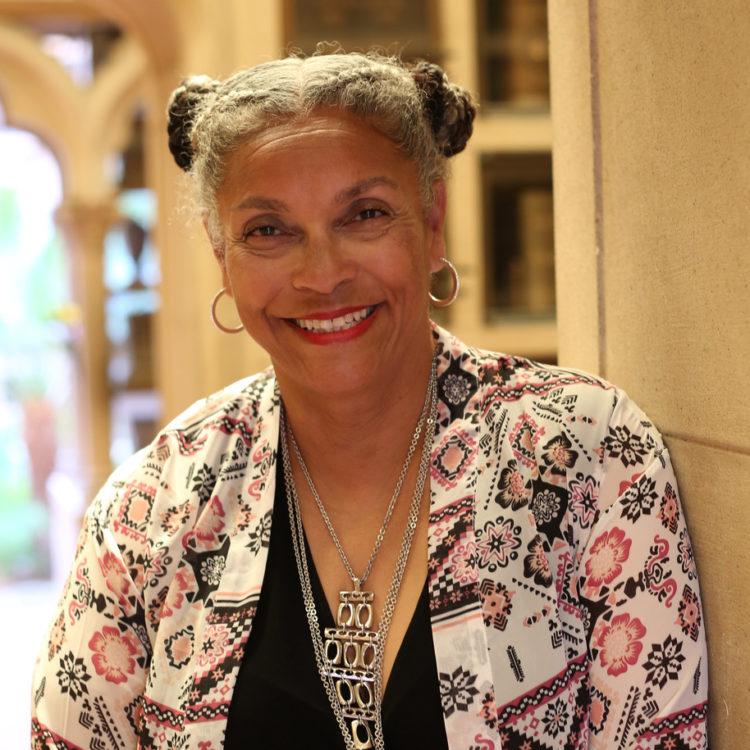
For myself, and many of my collaborators in House/Full of BlackWomen, we got to rest for the first time. With an extended period of not having to commute or just with a slowing down. I experienced it because I teach at Stanford. I realized how exhausted I was when the pandemic first hit. I love my job and the commute is hard. Being able to not have to run from here and there to meetings and gatherings, I realized the gift of the pandemic was being able to slow down. Ellen [HFBW lead-collaborative artist Ellen Sebastian Chang] first articulated this when the pandemic hit, but there’s a way in our slow, deliberate process that we were prepared for the shelter-in-place. It was like an affirmation that the work we’ve been doing in cultivating trust in our process, working performatively in small spaces and small ways, we were primed for this moment.
The immediate challenges were not being able to be together in the space the way we have done for the last six years in the House/Full of BlackWomen project. We gather monthly so to not be at the table in person, with each other, was hard. The levels of isolation from those who live alone, those who didn’t live in Oakland but would travel into the city to do the work ... not being able to travel and work together has been an emotional toll. We ended up having to transform our project and think about performance differently. The idea of transferring our performance work to be on Zoom was not anything any of us found inspiring our imaginations. It was difficult to figure out how to be physically distant while socially intimate.
Open your window to include pre-COVID times and during the last six years while developing House/Full of BlackWomen, have your ideas about what it means to be productive changed?
First, I’ll say that’s a question I don’t know I can answer. When we think of productively it is a word that feels like it’s about making something, producing a product. Over the last five years, we’ve prioritized our process over product. We started with a two-year project that increased because we felt we were just digging into what our process was.
That process included trust-building, cultivating rituals to support the work. My work as a dancer/performance-maker is rooted in Yoruba ritual and a commitment and focus that came out in the open eight years ago. The process is driven by cultivating ritual and listening to each other. These things don’t seem productive by a standard of “we got in a studio and we made a piece and it goes like this.” The work has been driven by our conversations, our check-ins, which informed the next episode.
That’s another thing about being prepared for COVID: the work has been about “going in” as opposed to jumping into rehearsals and making work. Letting the work reveal itself through the ritual of conversation, of calling for the spirit for this particular work. It’s a way that I work that now, anytime somebody new coming in who’s used to a more traditional structure of rehearsal will be like, ok, but how are we getting to the piece? I’ll respond by saying, “wait for it.” You have to default to trust. I, too, have to trust it even though I’ve devoted my artistic practice to working this way.
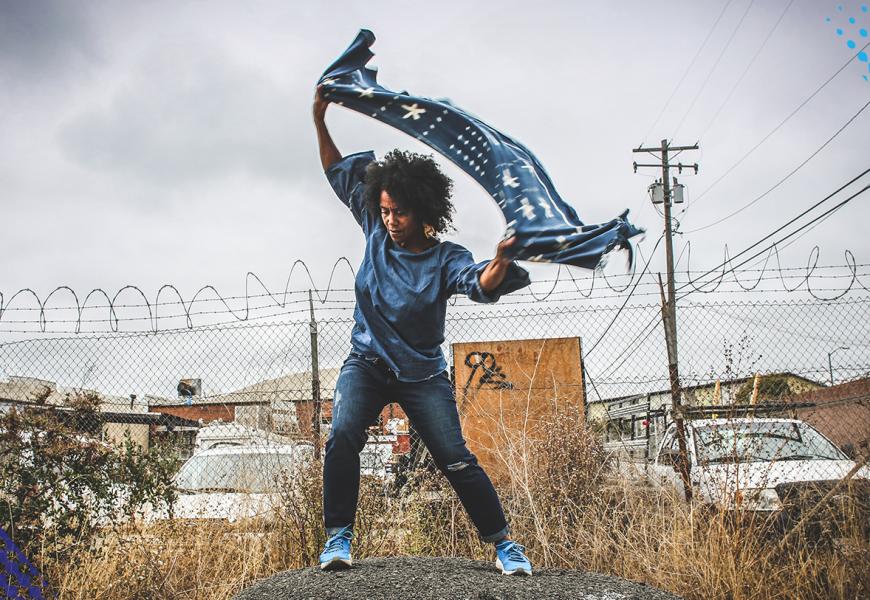
There are central tenets you hold as you make work according to the Yoruba Lukumí spiritual techniques you’re referencing. For people familiar or not with Yoruba but perhaps not sure how a choreographer might apply the concepts, what are the working methods you use to address topics in your work like social and environmental justice, race, gender identity, and belonging?
The idea that these notions are siloed as individual is part of the problem. In the Yoruba tradition, everything is everything. That fundamental belief, the basis for it is that every aspect of nature is living and represented by a specify divinity or Òrìṣà. It’s not just our physical nature but also our human nature. the Òrìṣà of the ocean, Yemaya, who represents the ocean and ocean life also corresponds to mothering, nurturing, patience, diligence, upheaval, and slowness.
Are they connected? They’re all connected. Justice connects to the oppressive structure of race through the Òrìṣà Chango [god of thunder]. The Òrìṣà dances move through our bodies. To dance, to sing, is all a form of prayer and it calls the energy forward. What happens specifically when we’re coming together? You’re going to be moving as prayer, improvise, talk about it, write about it, sing together — it honestly depends on the spirit of what we’re trying to evoke.
We spend time in research on issues of social justice, but we’re less interested in making work that portrays the injustice. We’re interested in shifting the vibration of the issue. There may not be a clear representation of the trafficking of young girls. That’s not what you’re going to see in the work. I’m not interested in making trauma art. Shifting the vibration doesn’t equate to focusing only on the positives, it’s attending to what the spirit of the issue needs in order to shift. My work is not literal, it’s enigmatic.
How will you use the Fellowship funds?
It’s a question that’s ongoing. My first priority is to eliminate some debt, to use the funds ... honestly, it’s a question I’m still grappling with. It will be funneled back into the work I do with the community. Exactly where depends on how I figure out [how] to get the most out of the resources.
The other support this Fellowship includes: Do you know how it will be applied and what difference the support might it make for your art and the community you serve?
I’ll use it first for financial planning, and also utilize the visibility to draw attention to the House/Full of BlackWomen project. My dream was to acquire a house to go into a land trust that Black women could co-own. That was inspired by the model the East Bay Permanent Real Estate Collective is a doing. [EB PREC is a community-centered development coop run and led by people of color that removes land and housing from the speculative market and creates permanently affordable, community-controlled homes.] I’m hoping to do collaborative work with EB PREC around gaining more education on how to make this happen. How the arts can be utilized and work for House/Full of BlackWomen to be a part of the movement to create more housing for folks to stay in Oakland. Yes, I, too, am housing insecure and would like to find a way to stay as an artist because my work has been about and for Oakland. But if my work no longer lives there, then my work is irrelevant. Who is my work then serving? I don’t know.
Black women as viewed and responded to when moving collectively in public spaces and as leaders in workplaces or while living in community: Will you speak about Black women, artists and nonartists, during the emergence of #MeToo and the BLM movements and how sisterhood and trust might grow?
I don’t think as Black women we’ve ever moved in any direct line. Making a way out of no way has always been our existence. Being in the United States, in the diaspora, has always been about Black women finding a way — and yet we’re the ones who are not considered. Our well-being is an afterthought, if a thought at all. We are also painted as strong Black women and are not deserving of empathy or tenderness.
Whether it’s in medical racism and how Black women in labor will be treated as drug-seeking if they’re asking for medication for pain; [unbelievably], it’s believed and it’s documented that we don’t feel pain the way other people do. That is in our collective psyche as a culture. That speaks to our experience in the world. We are not thought about. Even last year with what happened to George Floyd, it took a while after he was murdered for some recognition of Breonna Taylor. We are not considered.
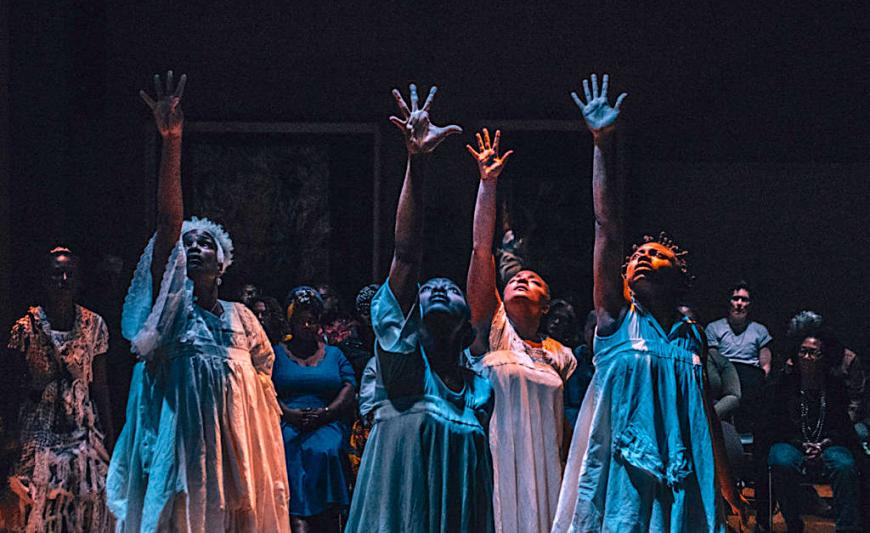
In this time, there may be generally a lot of movement, but we’ve never been able to rely on that. In this moment we can figure out how we take care of ourselves. I don’t mean that in terms of independent of a collective responsibility to take care of Black women. What I mean is in the way of Stacey Abrams, who’s forged a movement and it’s not about her being individual but working collectively, stepping forward, insisting on our right to be well, and also reinvesting in ourselves.
It seems simplistic, but it’s the thing that historically has been needed to be maintained and be committed to. Instead of “society needs to change,” no, I need to change first, to cultivate trust with my sisters, do my grief work. Coming back to House-Full of BlackWomen, we came together [and said], “yes, we are Black women.” People can think that means there is trust. No, there wasn’t trust. We actually realized we needed trust time, because we are all very wounded. Trust is not a given, it is earned and cultivated with time. That’s the piece, socially, that we need. To not just assume trust is there. Trust will show itself not to be there [if we assume it will exist] without doing the work.
Where in the arts pipeline are the largest impediments to achieving greater equity and accessibility to supportive structures? What are the best next steps needed to move artistic fields (dance, music, film, theater, and others) forward? What is your most fantastic, future dream?
I have always felt — I say this as not exclusive to arts as a profession — that as an artist, if we could divest from the military and pay artists an annual salary, we eliminate what ends up happening. I am so grateful for this fellowship and at the same time, there are so many artists struggling to survive. If we as a country, as the world, if we could truly value what the arts do ... art is nourishment for our soul. Artists capture the culture, the moment in time, it’s held through dance, music, visual arts. If we had a structure that paid artists the way the military offers a salary, if we divested from military and invested in artists, that’s what I dream of.
Artists are able to spend the time doing what they do, which is to make the work for the people. If it’s entertainment, rooted in social justice, or done for healing — whatever the focus — that they get to make that work. In traditional societies, the art is everything. This is how you worship. It’s valued. That’s [in] so many cultures. Yes, when I dream that’s what I think: Everyone is able to make work, be themselves, and get paid for it. I wish that for educators and everyone doing essential work. Even the idea of what is nonessential work in this time? What would quarantine look like for you if you had no access to film, music, visual art? What if shelter-in-place shut that down?
Part of our survival mechanism as artists and humans is that you figure it out. But the fact that we live with a Jeff Bezos and bazillionares who become more rich — if they would give a tenth of their salary, they could feed an entire state. How do we let this hypercapitalism happen? We’re smart and we’ll figure out a way.
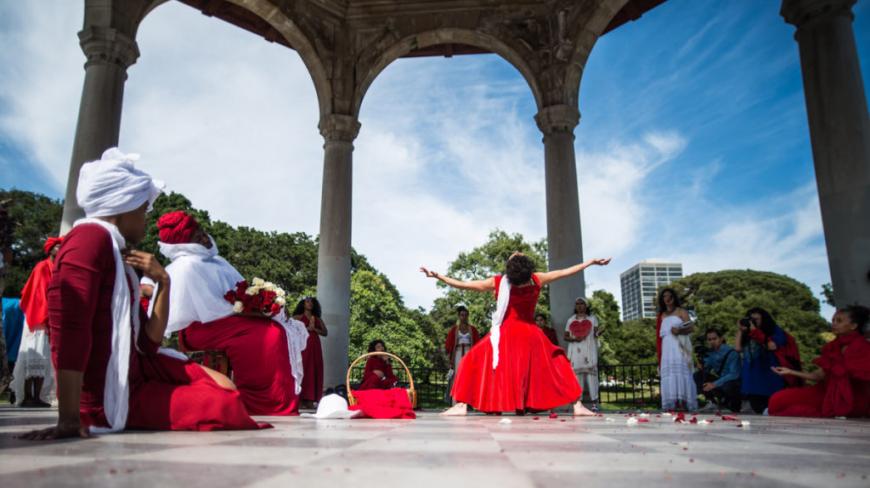
Will I stay in Oakland? I’m here and I’m scrappy; but what does it mean to be scrappy in a society with great inequities? That isn’t where our energies should go. I think of humanity. How do I find a way to stay connected to the people I love? Whatever blessings come my way, how do I keep reinvesting that in my community? I’m going to use whatever I have to support those in my community. That $100,000 doesn’t allow me to support my community the way they need to be supported, but what I can do is find a moment to breathe and become more economically savvy or reinvest in a way that doesn’t bring me back to zero but generates opportunity. How that happens? I don’t know, but I’m learning.
Lastly, there’s a way we’re socialized to know in advance, to have it all figured out before you do it. It’s a masculine principle: plan, execute, get there. What I embraced through House/Full of Black Women is to value the unknown, the space you don’t see, the dark spaces. We’re born from a dark space called the womb, and no one knows who they’ll become. We can lean into the dark. What I want is to make a way for me to stay in Oakland and my community to stay. I’m clear about where I want to get to, the path that will get me there will guide me as I go along.


